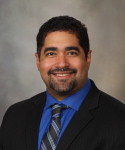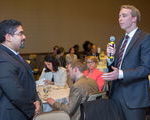Teacher of the Year award for Jorys Martinez-Jorge, M.D. – empathizing with struggling students
Jorys Martinez-Jorge, M.D. (PLS ’14), Division of Plastic and Reconstructive Surgery, Department of Surgery at Mayo Clinic in Rochester and assistant professor of surgery, received his first Teacher of the Year award from the Mayo Fellows’ Association. He says he has special empathy for students who struggle. He’s been down that road himself.
 Dr. Martinez-Jorge is from the Dominican Republic and didn’t speak much English before coming to the U.S. for general surgery residency on the East Coast.
Dr. Martinez-Jorge is from the Dominican Republic and didn’t speak much English before coming to the U.S. for general surgery residency on the East Coast.
“It was very hard, coming from another country for training in the U.S.,” he says. “I was held back my first year of residency because my English wasn’t good enough. I worked 12 to 14 hours at the hospital, then went home and studied English with Rosetta Stone for two hours, and then studied for exams. That first year was tough.
“Where I’m from, medical training is very hierarchical. You don’t speak to the attending, and you stand when he or she enters the room. When I began training in the U.S., I was reserved, and it appeared that I didn’t know things. I didn’t shine as much as I could have. As a result, I always give trainees a chance for second and third impressions. Not everyone may feel 100 percent comfortable initially, so they may not shine right away. It may just take them some time. I don’t criticize them right away. We all have great potential. If you’re at Mayo Clinic, you’ve already proven yourself. It’s my job to make them feel comfortable.”
He says he’s proud he persevered and that it made him a better person.
“I didn’t start out strong, but I won the chief of the year award by the end of my general surgery training at Beth Israel in New York. This experience gave me special empathy for students who need extra time. I want to be a symbol of what you can do and achieve. I want residents to know that no matter how bad a situation is, there’s always hope. Having a mentor give me that advice would have meant the world to me 15 years ago.”
 What’s your teaching style?
What’s your teaching style?
The No. 1 goal in surgery is safety, but I don’t want to make learning stressful.
My experience in training in general surgery was very rigid. I never felt relaxed in that environment and was always worried what the attending physician was thinking about me. Now, as a teacher, I try to keep the atmosphere fun and enjoyable. We perform surgery every day; we should enjoy it. I try to be relaxed in the OR. I never lose my cool, even when things don’t go smoothly.
I give criticism in a way that encourages residents to reanalyze things. They’re young and developing their style, which can be a delicate situation. Some residents require extra time, and I’m happy to guide them through that. I need to be there for them. With me, there are no barriers between consultant and resident.
What’s rewarding about teaching?
I learn, too. It keeps your knowledge fresh. You have to be as up to date as you can be. If you’re not teaching, you won’t evolve and grow as much.
As a young faculty member, I’m always receptive to what residents have to say and what they’ve learned from others. In plastic surgery, there often are many ways to do the same thing. Residents have told me Dr. So-and-So does it this way. If it’s effective, I’ll consider adopting it.
What makes me the most proud is when those residents who don’t start out strong and, with guidance and mentoring, turn out to be the strongest residents. It’s satisfying to see them evolve and be the best they can be.
How do you know when you’ve done a good job teaching?
I’ve done a good job when someone flourishes and is successful when they leave Mayo Clinic. The best measure of success is when they get good job offers and do well in practice.
Who were your teaching role models?
I’ve learned from our division chair Samir Mardini, M.D. (PLS ’06), to be more attentive to details and always do a job as perfect as it can be. Another great role model is Uldis Bite, M.D. (S ’90). Dr. Bite is always so joyful, welcoming and nonthreatening. He made it easy to learn from him. Steven Moran, M.D. (HAND ’02), is another great role model and friend who always makes you feel comfortable and makes learning easy and enjoyable. I’ve had the privilege to train with so many talented mentors. I will always be grateful to all of them.
What does the Teacher of the Year award mean to you?
I was pleasantly surprised to receive the award. It means a lot to me and encourages me to be more and more involved with residents and medical students. I’m still a young faculty member. Some physicians’ enthusiasm fades over time. I don’t want to lose that and let students and residents down. Recognition like the Teacher of the Year award keeps my enthusiasm even higher.
For me, being enthusiastic about teaching comes naturally. I love doing it.
Student comments:
“Dr. Martinez-Jorge is one of the rare teachers who intimately remembers what it is like to be a trainee. He anticipates common challenges, provides just enough assistance and finds ingenious ways to make you a better surgeon.”
“His strengths as a teacher are only magnified by his perpetual optimism and kindheartedness, which patients and students both benefit from.”
“He sets a great example during stressful times and is patient and understanding.”
“He exemplifies the qualities of putting patients first while maintaining a wonderful disposition. He is a joy to work with, and I feel as though I learn something new after every case with him.”
“Dr. Martinez-Jorge is the kindest surgeon I know while being an incredibly hard worker and excellent surgeon. I love being on his service because I know that I will learn by example how to operate and enjoy what I am doing.”
“The staff, patients and everyone around him are inspired by his knowledge, skills and demeanor. He is a true asset to the Division of Plastic Surgery.”